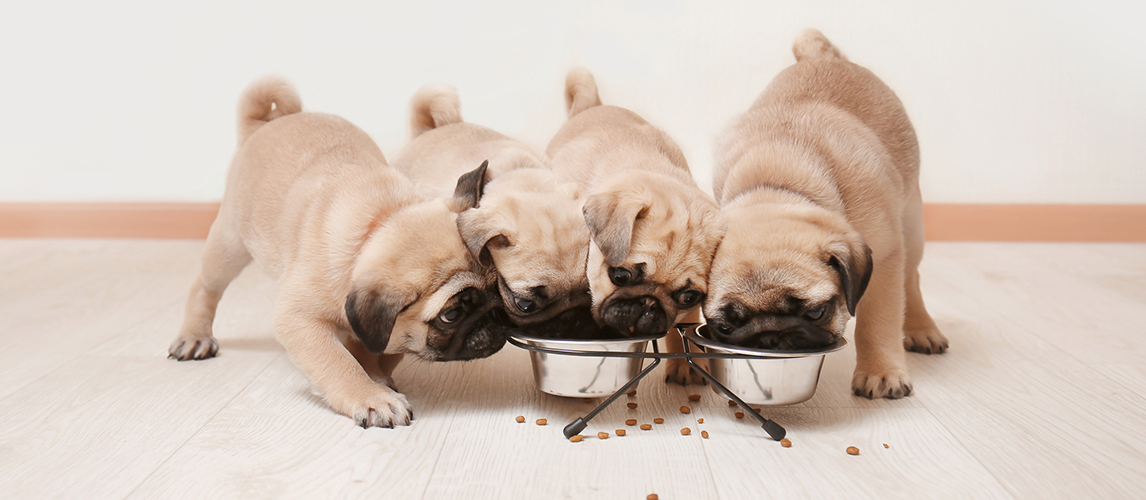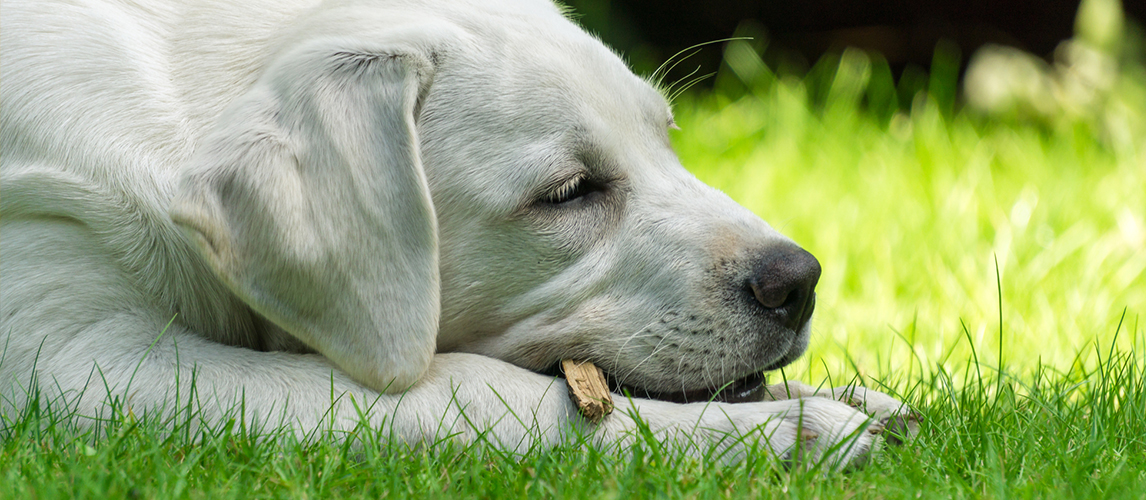It’s no secret that the best thing you can do for your puppy’s oral health is to brush their teeth regularly. Professional cleanings can boost their dental hygiene, leading to healthier, stronger, and whiter chompers. But what if you’re short on time and simply cannot manage to brush your dog’s teeth every day? Worse yet, what if your pooch is skittish and won’t let you near its mouth every day? A fantastic top-up between regular brushes is dental chews. Available in both edible and non-edible varieties, most dogs see dental chews as either treats or toys, so they’re super-easy to use.
But with so many different products available for purchase, finding the best dog dental chews for your pup can be challenging. To help you in your selection process, we tried and tested some of the most popular products on the market. The result is a list of five excellent chews that help reduce plaque and tartar buildup and freshen breath, plus a neat buyer’s guide!
The 5 Top-Rated Dental Chews for Dogs
1 Greenies Dental Treats Original Teenie
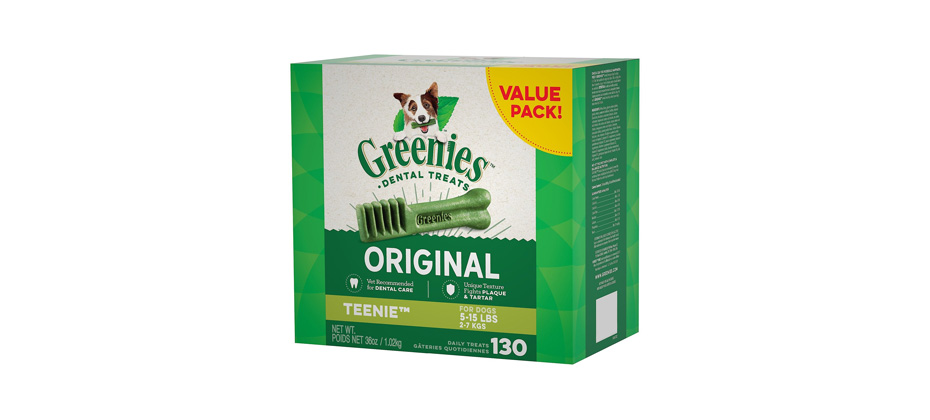
- Packs 26 kilocalories per dental chew
- Composed of 30% protein (minimum) and 5.5 to 7% fat
- Contains 6% fiber (maximum) and 15% moisture (maximum)
- Enriched with calcium, phosphorus, and niacin
- Fortified with Vitamins A, B-complex, D, and E
- Supplemented with magnesium, zinc, iron, selenium, copper, manganese, potassium, lecithin, and choline
One of the best things about the Greenies Original TEENIE Dental Dog Chews is that they provide a nice blend of macronutrients and micronutrients to help enhance their dental health-giving benefits. Their chewy formulation is flavored in delicious poultry goodness so your pet dog will be more than enticed to chew on them. Each doggie treat is packed with bone and teeth-building and strengthening calcium and phosphorus, as well as choline and lecithin for additional health benefits.
The chewy texture of the Greenies TEENIE serves like a brush on your pooch’s teeth and a sponge on the gums so that food particles are effectively removed and the formation of plaque and tartar is prevented. The recipe is made of only select ingredients so it’s easy to digest; although it does contain wheat gluten. So, if your dog has food allergies and sensitivities, and you’re looking for a grain-free dog dental chew, you might want to skip this product. If, however, your pup is fine with grains (and most dogs are), definitely give these tasty and chewy treats a try!
Wheat Flour, Wheat Gluten, Glycerin, Gelatin, Oat Fiber, Water, Lecithin, Natural Poultry Flavor, Minerals (Dicalcium Phosphate, Potassium Chloride, Calcium Carbonate, Magnesium Amino Acid Chelate, Zinc Amino Acid Chelate, Iron Amino Acid Chelate, Copper Amino Acid Chelate, Manganese Amino Acid Chelate, Selenium, Potassium Iodide), Dried Apple Pomace, Choline Chloride, Fruit Juice Color, Vitamins ( Dl-Alpha Tocopherol Acetate [Source Of Vitamin E], Vitamin B12 Supplement, D-Calcium Pantothenate [Vitamin B5], Niacin Supplement, Vitamin A Supplement, Riboflavin Supplement [Vitamin B2], Vitamin D3 Supplement, Biotin, Pyridoxine Hydrochloride [Vitamin B6], Thiamine Mononitrate [Vitamin B1], Folic Acid), Turmeric Color

2 Virbac C.E.T. Enzymatic Oral Hygiene Chews For Dogs
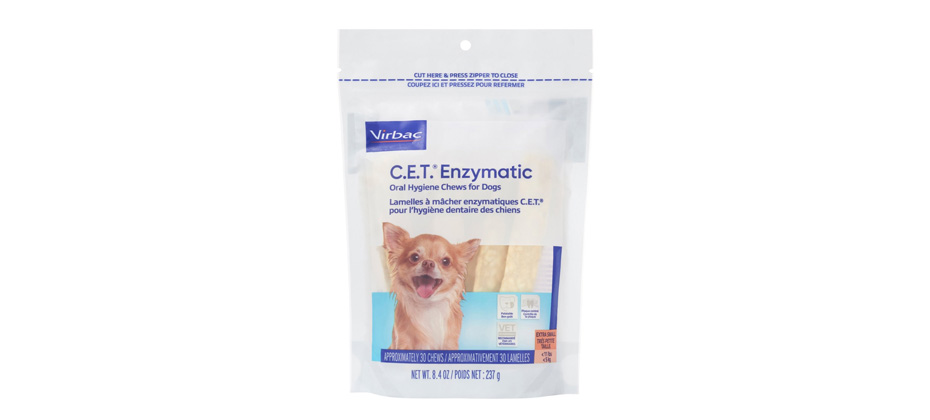
- Each oral hygiene chew provides 30 kcal for small dogs; 32 kcal for medium-sized dogs; and 54 kcal for large-sized breeds
- Contains a minimum of 75% protein and 1% fat
- Rated with maximum of 3.5% fiber and 16% moisture
- Enriched with glucose oxidase enzyme provided by Aspergillus niger
- Contains real beef rawhide
Out of all dental chews we reviewed, Virbac’s C.E.T. Enzymatic Oral Hygiene Chews contain the highest protein levels at a minimum of 75%. Protein is an important macronutrient that dogs need for optimum development of their tissues, including those found in the oral cavity. However, caution should be observed in giving the Virbac dental chews to canines who are diagnosed with kidney disease or those with significantly reduced renal function. Too much protein can exacerbate the kidney problem.
If your pup has no kidney problems, these are a fantastic choice as they feature the exclusive Dual-Enzyme System. Not only are they made from top-quality beef hide, but they have an abrasive texture which greatly helps loosen tartar and clean teeth. Best of all, they’re quite tasty, so if your pooch likes the beef flavor, they’re bound to love these treats as well. Oh, and they’re also grain-free!
Beef Rawhide, Dextrose, Poultry Digest, Maltodextrins, Hydrolyzed Vegetable Protein, Potassium Sorbate, Dried Aspergillus Niger Fermentation Solubles, Primary Dried Yeast, Dried Whey Protein Concentrate

3 Pedigree Dentastix Triple Action Original
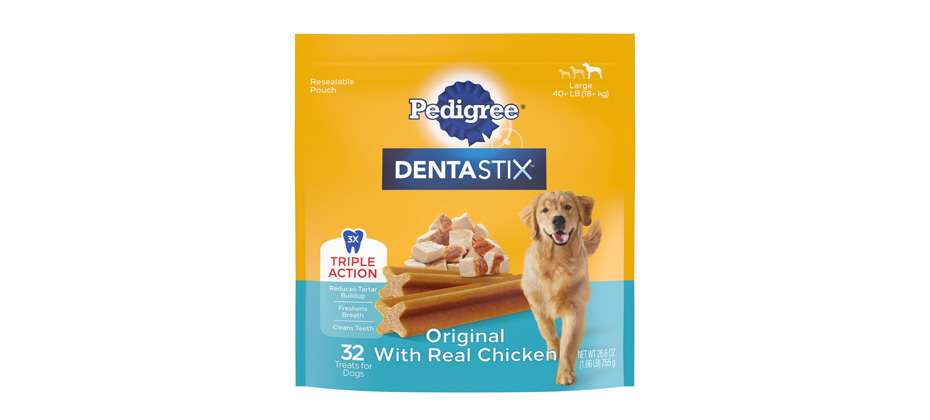
- Delivers 53 kilocalories per dental treat
- Provides 8% protein (minimum) and 1% fat (minimum)
- Contains 4.5% fiber (maximum) and 18% moisture (maximum)
- Enriched with potassium, zinc, copper, and iron
- Contains green tea extract and turmeric
- Contains Vitamin B-complex and Vitamins D and E
Energy-dense. That is the most appropriate description for these dog chews from Pedigree. The Dentastix has been around for many years and it has the trust of countless dog owners as well as veterinarians all over the world. What makes the Dentastix so popular is that each stick is packed with 53 kcalories, making it ideal for snacking after playing and/or exercise.
The unique design of these doggie chews also helps remove stubborn food particles that may have been stuck in the gum line or in between teeth. The other great thing about Dentastix dental hygiene chews is that they come infused with turmeric and green tea extract which are both acclaimed for their anti-inflammatory and antioxidant properties, respectively. They also come with a good mix of B vitamins and the vitamins E and D. However, currently, there is controversy regarding their high-calorie formulation. Their minimum protein and fat content is rated at 8% and 1% respectively, yet they has a much higher calorie profile than the other products on this list. Nevertheless, Dentastix is an excellent option for highly active dogs who require not only excellent dental health but also added energy to perform their activities.
Rice Flour, Wheat Starch, Glycerin, Gelatin, Gum Arabic, Calcium Carbonate, Natural Poultry Flavor, Powdered Cellulose, Sodium Tripolyphosphate, Iodized Salt, Potassium Chloride, Vitamins (Choline Chloride, L-Ascorbyl-2-Polyphosphate [Source of Vitamin C], d-Calcium Pantothenate, Vitamin B12 Supplement, Vitamin A Supplement, Niacin, Riboflavin Supplement [Vitamin B2], Pyridoxine Hydrochloride [Vitamin B6], Vitamin D3 Supplement, Thiamine Mononitrate [Vitamin B1], Folic Acid, Alpha Tocopherol Acetate [Source of Vitamin E]), Potassium Sorbate (A Preservative), Smoke Flavor, Zinc Sulfate, Green Tea Extract, Turmeric, Iron Oxide Color, Copper Sulfate.

4 Milk-Bone Brushing Chews For Dogs
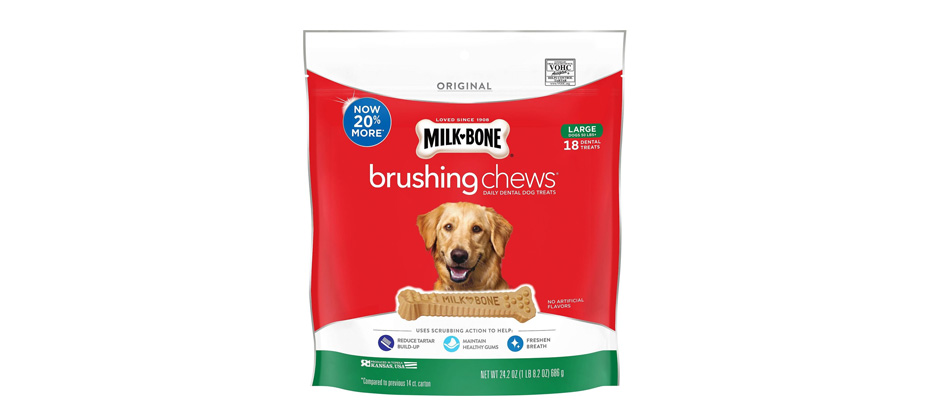
- Provides 31 kilocalories per doggie chew bone
- Contains 12% protein (minimum) and 1% fat (minimum)
- Contains 8% fiber (maximum) and 18% moisture (maximum)
- Enriched with 12 essential minerals and vitamins
- Includes calcium, manganese, copper, iron, and zinc
- Contains Vitamins A, D, E, and Vitamin B-complex
Boasting of a seal of acceptance conferred by the Veterinary Oral Health Council, Milk-Bone’s Advanced Oral Care Brushing Chews Daily Dental Dog Treats pride themselves on a very unique design. The treats are shaped like the classic doggie bone yet come with ridges and nubs that act like enlarged bristles of a human toothbrush. This handy design makes the Milk-Bone dental chews for canines really effective when it comes to the mechanical removal of food particles from teeth. In fact, they boast a VOHC seal of acceptance!
They taste surprisingly delicious, too, so dogs won’t have any issues chowing on them. Milk-Bone also contains a good mix of proteins and fats, although its moisture content is one of the highest in this list. Not that this is inherently bad; in fact, it is especially beneficial for doggies that rarely drink. However, this does mean that the remaining 82% is what actually constitutes the nutrient value of Milk-Bone. This all said, this is not a nutritional supplement, so we’re thankful that the company infused quite a lot of micronutrients into their dog dental treats, including the ever-beneficial calcium.
Rice, Powdered Cellulose, Chicken By-Product Meal, Propylene Glycol, Dried Skim Milk, Modified Food Starch, Dextrin, Water, Sodium Tripolyphosphate, Bone Phosphate, Calcium Sulfate, Gelatin, Animal Digest, Potassium Sorbate (Used As A Preservative), Phosphoric Acid, Titanium Dioxide (Color), Minerals (Ferrous Sulfate, Zinc Oxide, Manganous Oxide, Copper Sulfate, Calcium Iodate, Sodium Selenite), Vitamins (Vitamin E Supplement, Vitamin A Supplement, Niacin Supplement, D-Calcium Pantothenate, Riboflavin Supplement, Pyridoxine Hydrochloride, Thiamine Mononitrate, Vitamin D3 Supplement, Folic Acid, Biotin, Vitamin B12 Supplement), Natural Smoke Flavor, Yellow 6, Yellow 5, BHA (Used As A Preservative).

5 Pawstruck Natural Cow Hooves For Dogs
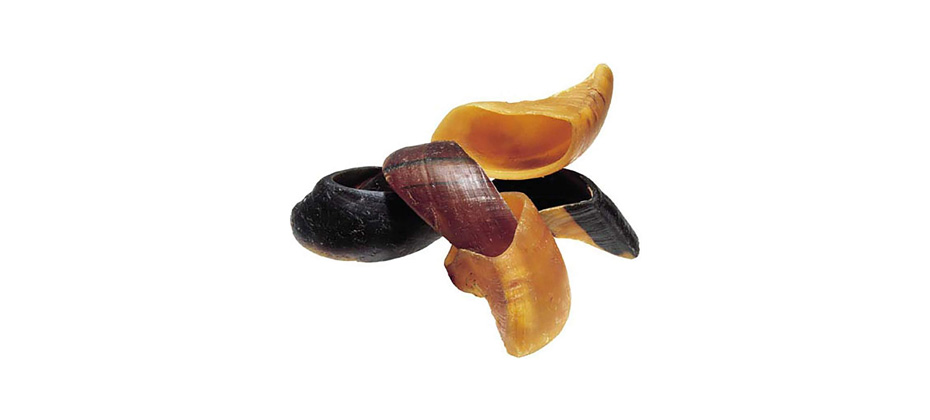
- Made of all-natural cow hooves sourced from grass-fed, free-range cattle
- Facilities approved by FDA and USDA
- No artificial ingredients added
- Precision roasted to lock-in flavors
Keep your pup’s teeth clean and help them stay trim with these long-lasting cow hooves from Pawstruck. Made from 100% natural ingredients, these chews are perfectly safe for all dogs as they’re free from artificial dyes, preservatives and colors. This being said, they’re not completely odor-free. After all, they’re natural cow hooves, so they’re bound to be a tiny bit smelly!
Importantly, Pawstruck’s cow hooves are made in the USA, so quality is guaranteed. In fact, these chews are made from free-range and grass-fed beef, and each batch of carefully harvested cow hooves is meticulously cleaned and then roasted to perfection to help lock in all the flavors of beef. Do bear in mind that when giving these chews to your pet, supervision is advised. Because they’re so hard, they can break or splinter if your dog is an aggressive chewer and it’s important to discard any broken pieces so your dog doesn’t end up eating them.
Cow hooves

How to Choose the Best Dental Chews for Dogs
Buying dental chews and treats is not that difficult as there are only a few things that you have to look for to narrow down your choices. While these may not be absolute, they can nevertheless serve as guidelines for you to consider when picking the best dog dental chews for your pooch.
Assess the Chewing Strength of Your Pet

If you’re planning to give a few dog dental chews to your pup, rawhide or cow hooves may not really be the best product for them. Their chew force will be quite insignificant relative to the toughness of the doggie dental chew. A more appropriate item will be something that is chewy. It should not be ultra-soft though, otherwise, there won’t be enough mechanical action to remove particles on the dentition. Likewise, if you have an adult dog that happens to be a very powerful chewer, giving it soft dental chews will be a very expensive proposition as they can easily chow down on these treats in minutes. What you will need are treats that are more resilient, and tougher against the chewing strength of your pooch.
Take a look at our guides on the Best Dog Treats and Best Rawhide For Dogs.
Look at the Ingredients
Dental chews come in various types. Some are formulated more like a nutritious treat while others go for the more natural without any added ingredients. In case you want something nutritious for your pet, you might have to really look at the ingredients, one by one.
In our list of the best dental dog chews, we listed 4 products that came with nutritional value. Now, it’s not enough that you only look at the different nutrients listed on the label, you will also have to check if this is appropriate for your pet. For example, we did mention that dogs thrive on a high protein diet, particularly for building and maintaining body tissues. However, too much protein is also not good for pets that have kidney problems since these macromolecules are very large and the kidneys will have to work double-time to filter them from the blood so that they don’t get flushed out into the urine. This puts additional strain on the kidneys which, if they’re already in a compromised state, can worsen their condition. Likewise, if your dog is allergic or sensitive to grains, you’ll have to look for grain-free chews that won’t trigger allergic reactions. Check out our review of dog food for kidney disease for more info.
As a rule, you need to pick products that contain only natural ingredients. However, it’s perfectly okay to get products with some synthetic ingredients, such as added flavor, as long as these are considered safe and do not constitute major ingredients of the product.
Consider Giving Your Hound Raw Bone
There are now plenty of recreational raw bones intended primarily for cleaning your canine’s teeth and oral cavity. These are often sourced from organic and antibiotic-free animals, so they’re perfectly healthy. However, they can pose some health issues. That is why we recommend always supervising your dog when they’re chewing on something, especially raw bones or cow hooves. These can get easily chipped and the fragments can be swallowed by your pet. This can injure the lining of your pet’s digestive tract or get lodged in the gut.
Choose Natural Dental Chews Wisely
Just like raw bone, there are manufacturers that offer natural chews like bully sticks, rawhide, cow hooves, pork ears, deer antlers, and the like. These are all excellent dog dental chews as they are hardy enough to withstand the chewing force of your pet. However, you really have to be wise when you do buy these types of chews as these are sourced from animals. Make sure that the animals these products are obtained from were grown and processed using natural and organic methods. There should be no antibiotics, bleaching, additives, hormones, or any other harsh substance used in the chews manufacture.
Do My Pets Really Need Dog Dental Chews?

Now that we’ve taken care of the business of how you can choose the right dental chew for your beloved dog, it’s time to address one of the nagging questions that newbie dog owners have. Does your pet really need a dog dental chew?
Well, let’s put it this way. Dogs spend most of the day licking, biting, nipping, and chewing on objects and surfaces that contain microorganisms like bacteria, viruses, or fungi. The food that we give them too, especially dry kibbles, is also filled with starch that bacteria and fungi really adore. It is this combination of environmental debris and leftover food particles that give canines a rather “unhealthy” oral cavity.
Normally, these microorganisms in our pet’s mouth do not cause disease; not immediately anyway. That is because it takes an awful lot of time for them to establish a foothold on the surface of your pet’s teeth. If food debris and other starchy particles are present on the teeth or in the gum line, this is an excellent chance for these germs to hide and start multiplying by feeding on the carbohydrates contained in these food debris particles. Over time, they will be releasing a very thin, very clear, yet very tough protective layer of film that we call plaque. This helps protect germs from mechanical forces. Give it a few more weeks and this thin layer of the protective film begins to harden into something like cement. Now, this is what we call tartar.

Underneath both plaque and tartar, the germs continuously secrete highly acidic substances that erode the surface of the teeth, creating tooth decay. If this reaches the gum line, it leads to irritation, producing gingivitis. If this is allowed to continue, both the teeth and the gums become affected leading to what everyone now knows as gum (periodontal) disease.
Again, if this is allowed to deteriorate, the bacteria can gain access to the blood vessels and be carried by the blood to be lodged into other organs inside the dog’s body. This is the start of more serious health problems like heart valve disease in dogs as well as massive infection of the blood. And to think that it all started with a few food debris and other particles that your dog failed to remove!
You really cannot blame your dog, though; no matter how smart, our canine buddies don’t know how to brush their teeth. They also don’t know how to use dental floss or even mouthwash. But the one thing they know and love doing? Chewing. That is why you need to give your pooch only the best possible dental chews that help physically remove the debris and particles that can become the starting point of the development of plaque and tartar.
So, to keep your dog’s teeth clean and breath fresh, consider not only brushing their teeth every few days but also giving them dental chews on a regular basis. For some dogs, this will be every day, for others, every other day.
You may also like our article on the Best Toothpaste For Dogs.
What are the Benefits of Dental Chews for Dogs?

Now that you understand why it is often necessary to give your dog dental chews on a regular basis, let us try to summarize what we have been discussing so far in terms of the benefits that dental chews provide to your pet.
Improve Teeth and Gum Health
Dental chews help clean the teeth and remove debris from the gums. This prevents bacteria from taking up residence in these areas so they will not create plaque and tartar. At the same time, germs will not secrete acids that will corrode the surface of the teeth, maintaining their integrity and strength while also firming up the gums. Technically, what dental chews do is improve canine dental health.
Reduce Bad Breath
Aside from the acids that bacteria secrete, they also give off byproducts of their metabolism. This mixes with your pet’s saliva, producing a characteristic foul odor. You really don’t want your pooch sticking its face right in front of you and licking you incessantly if its breath stinks like the sewer! Preventing bacteria from colonizing the teeth can help reduce bad breath in dogs.
You may also like our guide on Dog Dental Spray.
Prevent Periodontal Disease
This is a natural end result of improved teeth and gum health. Because the integrity of the teeth and gums is preserved, you eliminate the risk of periodontal disease in your pet. Additionally, this also helps minimize the risk of developing oral health-associated systemic infections.
What are the Different Types of Dental Chews for Dogs?

As you’ve probably noticed by now, there are various types of chews for dogs that you can buy to help improve the dental health of your pet. Here are some of the more common.
Dental diets
These are dry kibble-like chews that provide nutrition while also helping your pet to clean their teeth, freshen their breath, and remove plaque. These are often larger than dry kibbles and are specially designed to have ridges or nubs for the mechanical removal of food particles.
Dental treats
There are certain products that look like an ordinary doggie chew but are specially blended with a variety of substances or even medications to help improve canine oral health. For example, there are dental treats that are infused with 10% of chlorhexidine gluconate which helps kill bacteria within the oral cavity.
Rawhide chews and bully sticks
These are excellent dog dental chews as they are more resilient to the chewing force of dogs. Depending on the product, these are also very rich in protein as they are sourced from animals. That being said, you’d have to be careful in your choice as there is a tendency that you might end up with a mediocre product.
Chew toys
Some dog toys are designed with ridges or nubs to help remove debris from the dog’s mouth. They’re typically made from rubber as this material is considered safe and is very resistant to chewing so your pooch gets to clean its teeth while enjoying some fun playtime.
Managing your pet’s oral and dental health is a necessity for preventing tooth decay, bad breath, and periodontal disease in dogs. Since dogs cannot brush their teeth, it’s a great idea to give your pet dental chews regularly, or at least occasionally.

